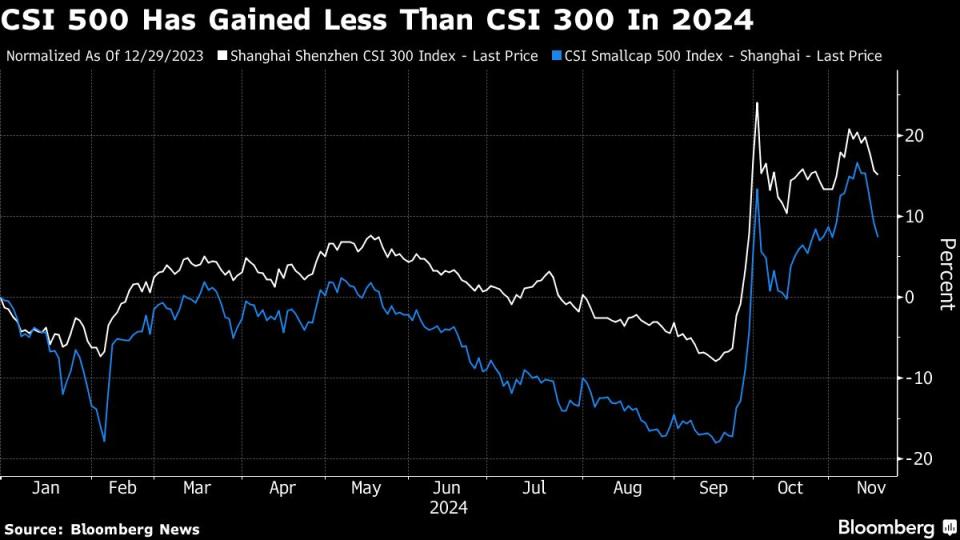
Fidelity Fund boosts investments in China’s mid-cap stocks, betting on fiscal stimulus to drive growth. Learn how George Efstathopoulos is leveraging the CSI 500 Index.
Fidelity Fund Bolsters China Stocks Amid Stimulus Prospects
After successfully navigating China’s stock market rally in September, Fidelity Fund’s George Efstathopoulos has increased his exposure to Chinese equities. The Singapore-based money manager, who oversees $3 billion in assets, is shifting his focus to mid-cap stocks listed on the mainland. This move is based on the expectation that fiscal stimulus measures will strengthen economic growth.
China’s Stock Market: A Volatile Year
The Chinese stock market has faced significant challenges and opportunities in 2024. In February, stocks plummeted to a five-year low, only to stage a remarkable comeback in late September. During this time, the CSI 300 Index surged by 32% in just six trading days, driven by aggressive monetary stimulus from Beijing.
Fidelity Fund capitalized on this volatility. Efstathopoulos raised his China stock exposure to 4% earlier this year, only to scale back as stocks soared. Now, he is re-entering the market with a focus on onshore mid-cap stocks, anticipating that they will benefit most from fiscal measures.
Mid-Cap Stocks: A Strategic Focus for Fidelity Fund
Fidelity Fund is targeting the CSI 500 Index, which comprises mid-cap stocks that have underperformed the blue-chip CSI 300 Index. Efstathopoulos believes mid-caps are better positioned to gain from domestic stimulus and are less vulnerable to geopolitical risks.
“Onshore shares are more immune to geopolitics,” he explained, emphasizing the advantages of investing in mid-cap companies. With China’s government expected to deploy stimulus measures soon, these stocks could outperform larger counterparts.
Navigating Risks in the Chinese Market
Despite the optimism, Fidelity Fund’s strategy is not without risks. Chinese stocks have lost momentum since early October as Beijing has prioritized addressing debt concerns over boosting consumption. Additionally, geopolitical tensions with the U.S. have added uncertainty to the market.
Efstathopoulos acknowledges these challenges but remains confident in Beijing’s ability to support the economy. “China has the ability to ensure domestic growth is decent,” he said. His confidence stems from the expectation that the government has sufficient “dry powder” to deploy if necessary, particularly if tensions escalate with the U.S.
Fidelity Fund’s Investment Approach
Fidelity Fund has rebuilt its China exposure using derivatives known as contracts for difference (CFDs), shifting away from previous investments in Hong Kong-listed futures. This strategic move has increased the fund’s China allocation to approximately 3% to 3.5%, aligning with its broader portfolio strategy.
The fund aims for an annual return of 7% to 9%, and its diversified approach—spanning equities, bonds, and derivatives—allows it to adapt to changing market conditions. By focusing on mid-cap stocks, Fidelity Fund is positioning itself to capture the potential upside from domestic consumption and fiscal stimulus.
Fidelity Fund’s Confidence Amid Mixed Data
Recent economic data from China has been mixed. Retail sales have shown signs of improvement, but deflationary pressures persist. Moreover, the global economic landscape remains uncertain, with U.S.-China tensions likely to escalate under President-elect Donald Trump’s administration.
Despite these factors, Efstathopoulos believes mid-cap stocks offer the most compelling opportunities. He emphasized that the CSI 500 Index, with its diverse composition of companies, stands to benefit significantly from fiscal policies aimed at stimulating domestic demand.
Why Fidelity Fund is Doubling Down on China
Fidelity Fund’s renewed focus on China underscores its belief in the country’s long-term growth potential. While some analysts remain cautious, Efstathopoulos sees opportunities where others see risk. By targeting mid-cap stocks, the fund is betting on sectors that are poised to benefit from government stimulus and reduced exposure to geopolitical headwinds.
The fund’s performance this year has demonstrated its ability to navigate volatile markets. Its decision to re-enter the Chinese market reflects its commitment to achieving steady returns while adapting to evolving economic conditions.
Conclusion
Fidelity Fund’s strategic move into China’s mid-cap stocks highlights its confidence in Beijing’s ability to stimulate economic growth. While risks remain, the fund’s diversified approach and focus on mid-cap opportunities position it well to capitalize on future gains. As fiscal stimulus measures take effect, Fidelity Fund’s bets on the CSI 500 Index could prove to be a winning strategy.